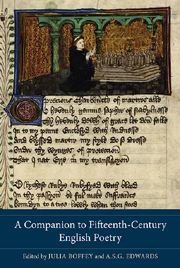Book contents
- Frontmatter
- Contents
- List of Contributors
- List of Abbreviations
- Conventions
- Introduction
- Part I Background and Context
- Part II Authors
- Part III Themes and Genres
- 11 Fifteenth-Century Chaucerian Visions
- 12 Historical and Political Verse
- 13 Classical and Humanist Translations
- 14 Romance
- 15 Scientific and Encyclopaedic Verse
- 16 Popular Verse Tales
- 17 Beyond the Fifteenth Century
- Chronology
- Index of Manuscripts
- General Index
12 - Historical and Political Verse
from Part III - Themes and Genres
Published online by Cambridge University Press: 05 July 2013
- Frontmatter
- Contents
- List of Contributors
- List of Abbreviations
- Conventions
- Introduction
- Part I Background and Context
- Part II Authors
- Part III Themes and Genres
- 11 Fifteenth-Century Chaucerian Visions
- 12 Historical and Political Verse
- 13 Classical and Humanist Translations
- 14 Romance
- 15 Scientific and Encyclopaedic Verse
- 16 Popular Verse Tales
- 17 Beyond the Fifteenth Century
- Chronology
- Index of Manuscripts
- General Index
Summary
Historical and political writing are related – at times identical – concepts, but ones that have enjoyed different trajectories in medieval and post-medieval literatures. While strong traditions of historiography were inherited from classical antiquity and refined and altered in various ways during the Middle Ages, the category of ‘political writing’ is largely a modern scholarly invention. Evidently, medieval political writing existed, as did a sense of the political, but it is not clear that it was recognised by medieval authors or readers as a distinct literary genre. (There is, for example, no equivalent to the term ‘historia’ to describe a work of political commentary or theory). In considering fifteenth-century historical and political verse, then, we are confronted with certain asymmetries. Historical verse comprises a sprawling, diverse corpus extending generically across many different forms of writing, and in its temporal scope from creation to the present. Political verse is at once more focused on contemporary or near-contemporary matters, but also, in many of its articulations, deeply interested in exemplarity – in searching out, that is, political matters from the historical record for the purposes of edifying the present. Given the somewhat diffuse and overlapping nature of both concepts, a rigid demarcation of their boundaries seems counterproductive. Instead, in this chapter, I will pay particular attention to moments at which historical and political verse intersected: to the intrusion of political commentary into historical narrative, to political verse as a form of contemporary history, and to history as a source of authority for political writing.
- Type
- Chapter
- Information
- A Companion to Fifteenth-Century English Poetry , pp. 157 - 170Publisher: Boydell & BrewerPrint publication year: 2013



